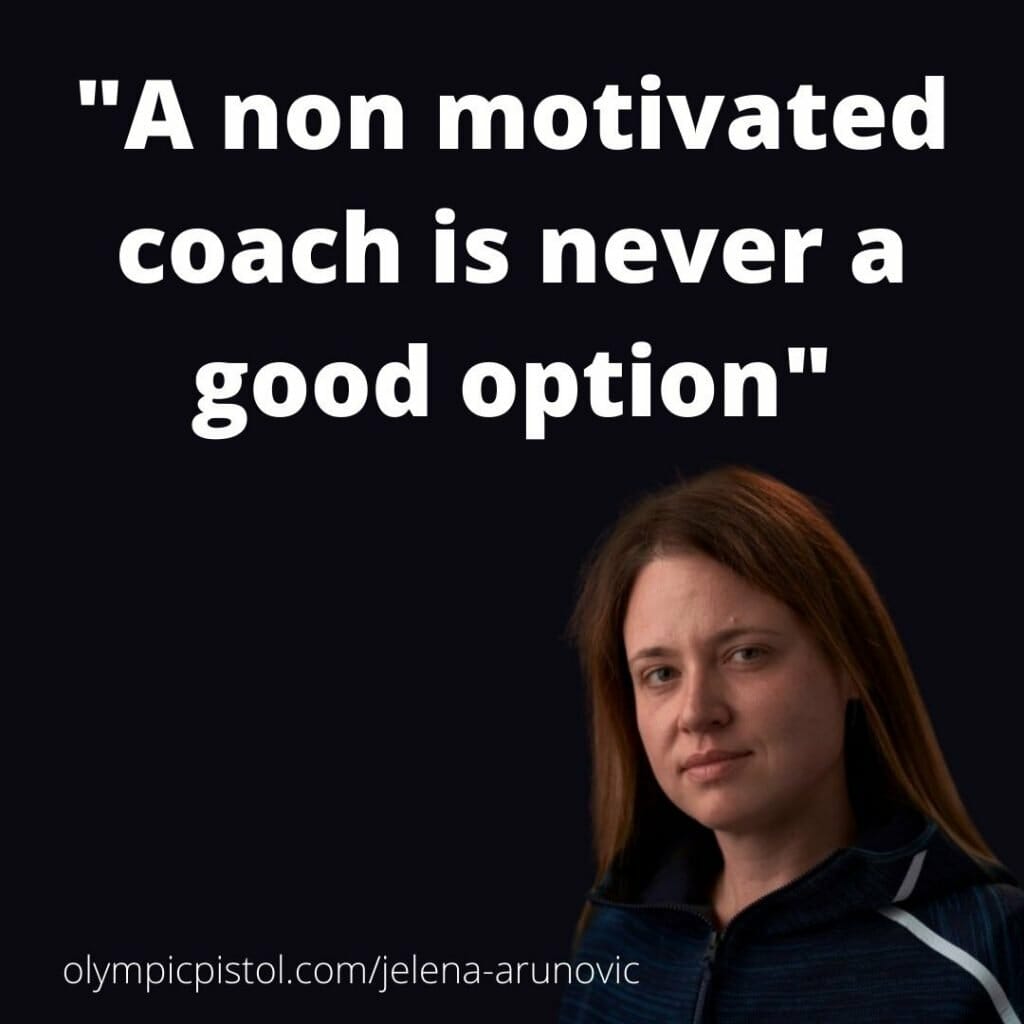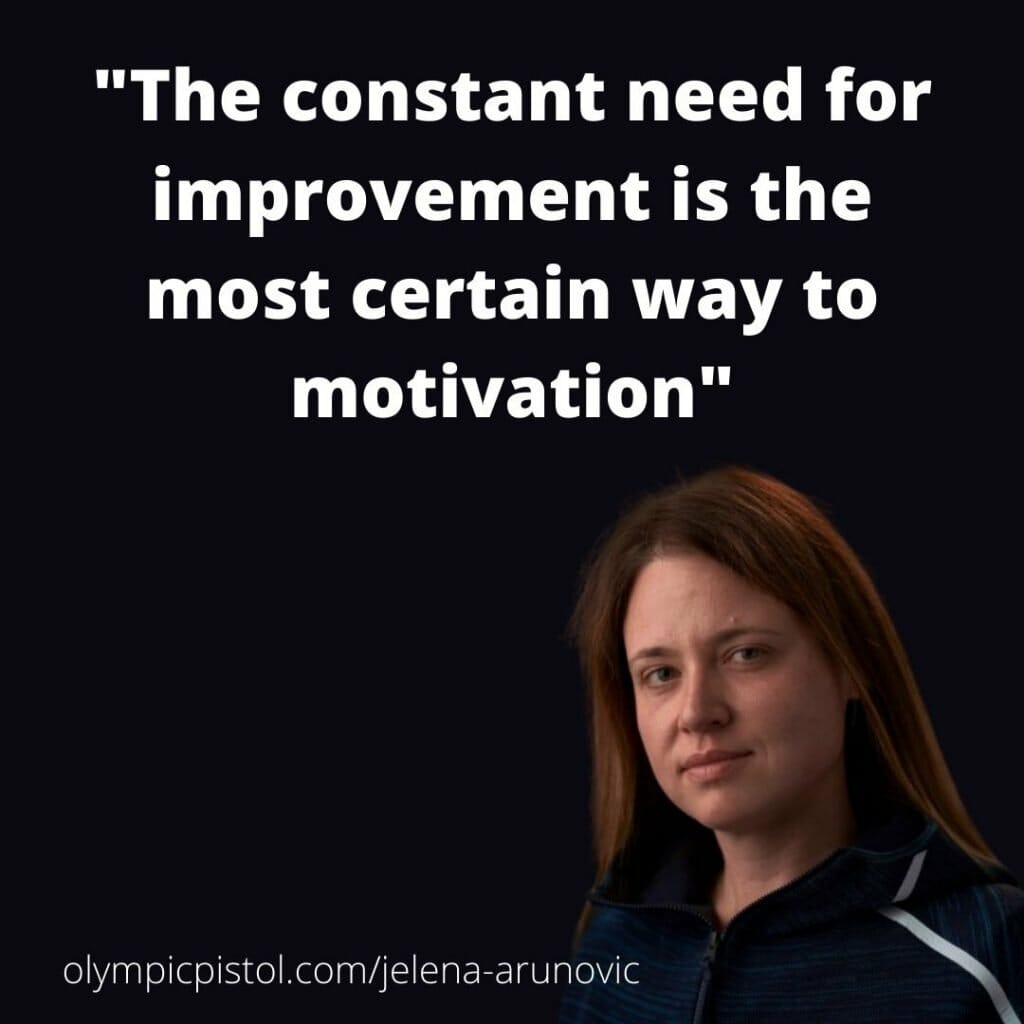Pistol coaches are an unspoken secret of our sport. They exist but they are hard to find, most federations and athletes don’t name them (they just say my coach or national pistol coach…) and they tend not to have a presence online (one of the reasons why I created the shooting sports coach directory where you can find Jelena’s contact details if you want to train with her). They are crucial for the progress of our sport at all levels, yet few talk about them or appreciate their work.
Jelena Arunovic is one of these unspoken secrets that everyone talks about. Her name just keeps on coming up. She’s the sister and coach of Zorana Arunovic (who says she picked up shooting because of her), and both coaches and shooters keep mentioning her name. I’m really happy she’s taken the time to answer insightfully to this interview, there’s plenty to learn!
Follow Jelena on Instagram and Facebook for more.

Table of Contents
How and when did you get into shooting?
Sport has always been a part of my environment, with my sister Zorana and my father, who was a professor at the Faculty of Sport of Belgrade University. With him I learned what sport is, what is training, what is recreational sport, what is the game, how tactics are prepared and other important things for the kid at age of 10….
However, I accidentally went to the shooting range because it was part of physical education classes in elementary school. We had a few mandatory shooting training sessions, and I liked it. During this period, Jasna Sekaric was the most dominant athlete in our country, and an idol to many young people. So, in this particular and accidental way, I discovered love for shooting sport, that’s still present after so many years.
What made you decide to dive into pistol coaching?
Since the beginning, I have had the mindset of a coach. I was always intrigued and interested in better preparation, being more precise at the beginning or end of a competition, thinking of how to train during the week when there is no competition, how to dose the load, how to warm up for training… What else can be done so the athlete becomes more precise?
A couple of years after Zorana started practicing shooting, when I felt that it was the right moment and when I evaluated that I was capable of that responsible role, I became her coach.
At what level are you coaching and how has your career progression been?
I am fully focused on Zorana and our preparations for the Tokyo Olympics. The delay due to Covid 19 has slightly changed our plans, but the goal definitely remains the same.
At the same time I am the head coach of the Serbian national pistol team. Our senior pistol team is very successful, but our problem is mainly in junior pistol categories (we’ve been struggling for a while with the lack of results at this age group).
I have developed myself in multiple directions as a coach. Something that I’ve been focusing on for the last couple of months is the science of motion control and the practical use and incorporation of its theory into shooting training. Since the sport itself is highly dynamic, I have no doubts that more knowledge than ever before will be needed in the future, as well as including many sports associates and experts.
If we take into consideration that throughout an entire career- on a constant and daily basis- we are searching for ways for an athlete to be more precise,shooting coaches are the experts on precision improving. In a few years time I can see myself as an expert in the field of precision improvement, but in some other sport.
What are you most proud of in your coaching career?
I am most proud of the consistency that Zorana and I have reached. One or two victories or successes can happen, but it takes a top athlete and a top coach to maintain consistency. I am proud of every success, because every single one of them has a background and a story that tells why that particular success is so important. But that is something only I and Zorana know, and I think that is how it is going to stay.
What is the most important thing a pistol coach can teach his athletes?
Pistol coaches- as every other coach- have to be an example for their athletes. We have to give a personal example when it comes to approach, discipline, working ethics, respect of our athletes and colleagues… If we, as coaches, don’t show up before scheduled time and do not have the necessary equipment, how can we expect that our athletes put their careers into our hands? It’s the truth for all the coaches, for all the colleagues that are educators.
Training is a process, and every process requires time, but the trust that we have received we have to justify on a daily basis!
What is your coaching philosophy and style like?
I like to be surrounded by associates that are experts in their own fields. I don’t feel the need to be the smartest in the room, but I am the only one who makes the final decision. Because of that reason it is extremely important to be in constant touch with your associates- who are people that share the same values- and never to question their judgements. But, the final decision is my privilege after all.
When it comes to coaching on the firing line, I see myself as a coach who actively takes part in the athletes performance. I don’t remember a single competition where I didn’t take my athlete out from the firing line, when I saw the situation was not developing in the right direction. This means that I have accustomed my athlete to my presence in trainings, and to my proactive coach role.
In competitions we don’t do anything that hasn’t been tested in training first. We do only things we have trained, that is well known, where there is no space for doubts. No moves out of the ordinary are an option (that’s not something that will make me smile).
How do you train your shooters and how often? What does a typical training day look like?
We are working six days per week, and training always begins at the same time. That way you give your athlete a possibility to plan and use their time during the day, before and after training in the best possible way. When we are in a training camp, of course, the planning changes significantly.
There is one more important thing to consider: athlete’s age. You can’t keep juniors and seniors on the line for the same amount of time. That would be highly inadequate and not a smart idea.
All of this is prone to change and it depends on the part of the season. Having one or two training sessions per day is not the same, or training and massage, or training and workout. Combinations are limitless.
What do shooters spend a lot of effort on that is not so important?
If a shooter is really trying hard and pays too much attention to something that means he or she is quite insecure when it comes to that specific element. There is no better sign for a coach what they need to work on a bit more in order to improve that or calm down the shooter and prepare the shooter better for the upcoming competition. It needs to fit in the bigger picture of course, but that’s why the coaching job is so creative and it constantly pushes us to search for a more efficient way of working with an athlete.
How do you keep shooters motivated in training and competition?
Motivation is something that needs to be worked on constantly. If I am not motivated to work with an athlete as a coach, the athlete feels it. Even if sometimes we forget what the motive is, it’s important to remind ourselves, because a non motivated coach is never a good option.
We are all going to go through rough moments, both in life and career, but it’s important to get back on track as quickly as possible. If a medal in a big competition is the goal, then it does not depend on our athlete only because there are 100 other athletes participating as well. If we make a number of other smaller goals on the road to that competition, and we share that with an athlete, we get a person who knows what they are aiming to achieve in each training and what is the goal in each of the competitions in return.
From the coach perspective I do not underestimate the significance that the medal has for an athlete, but I am also not exaggerating when it comes to success if there were things in performance that were not satisfying. The constant need for improvement is the most certain way to motivation, and we all know there are always some segments in performance that need to be worked on.

What do you make your shooters do before a match or training to get into the appropriate mind space?
First of all, they need to be there on time and to have plenty of time to prepare for training with no hurry and in their own rhythm. That means that preparation for training (routine, dynamics and duration) is a constant and a way to prepare the athlete for the level of seriousness that’s required. As someone who is strict when it comes to competition and doing things that we tried in training only, training preparation is identical to competition and it’s part of the athletes’ routine.
How do you manage shooter nervousness through a competition? Can you give an example of inner talk to use when things are not going well?
I think everyone is nervous, not only shooters. It’s something that coaches expect and that they are prepared for. My advice is not universal, it has to be adapted to the specificity of each shooter. That’s why it’s important to have a coach with you and to create a path you will walk together, made of all the states that one competition performance carries along.
What aspect of the shooting technique brings the biggest improvement? How would you recommend people to train it?
We know there are different ways of preparation, but at the same time there are clearly differentiated segments of technique. We can’t give priority to something, because that means we are putting something else on the side. If we take a look at a big picture, each period of the season requires a different approach, to give priority to some other aspect, and everything has to be considered in the context or a larger previous preparation. Changing training context is not something I agree with or something I like doing. The key is in finding balance in the amount of work spent on each of the elements of technique, and in synchronizing with other elements.
What would you recommend pistol shooters to focus on improving (technical, mental, physical…)? Can you share one exercise or routine for this? How do you think they should go about it?
All types of preparation are important and they are dependent on each other.
We can’t work on tactics if a shooter has bad technique.
In some cases technique is very good until the first signs of fatigue, which means that physical preparation is under the necessary level.
I do not like hearing that shooting is only about mental preparation because this denies all the effort and work put into it in the shooting range.
We, as coaches, need to balance between different ways of preparation and know when and how to prioritize each one of them. Preparation is not the same before the Olympics or in the beginning of the season. It is not the same to prepare an experienced athlete who knows the technique by heart or a young athlete who is just reaching competition period.
Can you share some examples of tactics to use during a match and what would trigger them?
Tactical approach is an element that’s pretty neglected in our sport. If we observe a marathon runner, long distance runner, cyclist, karate player, swimmer, etc., they all have to work a lot on their tactical preparation. In our sport it’s not so obvious, but I managed to bring some new things into my work with Zorana.
Tactics is the way the shooter leads the match, taking two factors into considerations: their current performance and their current sensations.
In training I work on empowering the tactical approach of a shooter in relation to a situation that I create for them. I will write more about this when I retire, I am sure it is going to be interesting to read.
Which tool or equipment can’t you live without as a coach?
My two stopwatches, binoculars and my notebook. I can’t even imagine a training or a competition without them. If you see me without, you know that something either happened to me or that someone stole them from my car.
What question would you have liked me to ask and what’s your answer to it?
What are my next goals?
Postponing of the Olympics has changed our plans but the goals remain the same. After the Games I would like to hang a university diploma on my wall. I would definitely like to make some new challenges for myself, like working with new athletes or in new surroundings. That’s something that seems like a reasonable next step in my career. Just like that, working on precision development at handball, basketball or volleyball players… why not?
Who would you recommend is interviewed next?
I recommend my friend and colleague from Poland, coach Jolanta Samulewicz.
